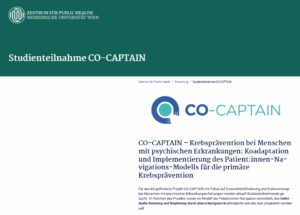In Austria, recent studies indicate a point prevalence of mental illnesses in the general population between 16 and 19.6%, with a reported 10-year prevalence of approximately 15.6% (Laszewska et al, 2018).er’s research.
Who is implementing the Austrian pilot?
The Medical University of Vienna organizes and manages the CO-CAPTAIN pilot site in Austria. It is one of Europe’s oldest medical training and research facilities with a history spanning over 650 years. Today, the Medical University of Vienna is the largest medical training institute in the German-speaking world, with about 8000 students and over 5750 researchers. Comprising 26 university clinics, 2 clinical institutes, 12 academic medical centres, and numerous highly specialised laboratories, it is one of the most important cutting-edge institutes in Europe for biomedical research.
Where is it being implemented?
For the implementation of the co-adapted patient navigation model for primary cancer prevention in people with mental ill-health experiences, the team at the Medical University of Vienna provides the patient navigators and is working in close collaboration with local clinics and NGOs. In particular, implementation sites include the Clinic Hietzing, the University Clinic Tulln, the psychosocial services in Vienna (Psychosoziale Dienste in Wien, PSD), LogInsLeben, and the rainbow house (Regenbogenhaus).
Local adaptations and actions carried out so far
The ongoing recruitment process has involved approaching potential implementation sites, establishing and maintaining contact with them, presenting and disseminating project information, creating and distributing posters and leaflets, launching a social media campaign, and directly speaking with potential participants at each recruitment site. In particular, at one implementation site, information on the project was provided in a monthly updated program sheet.
As part of patient navigation, the team at the Medical University of Vienna maintains regular contact with participants and gathers, for example, up-to-date information materials targeting primary cancer prevention and low-threshold opportunities tailored to the individual’s needs.


